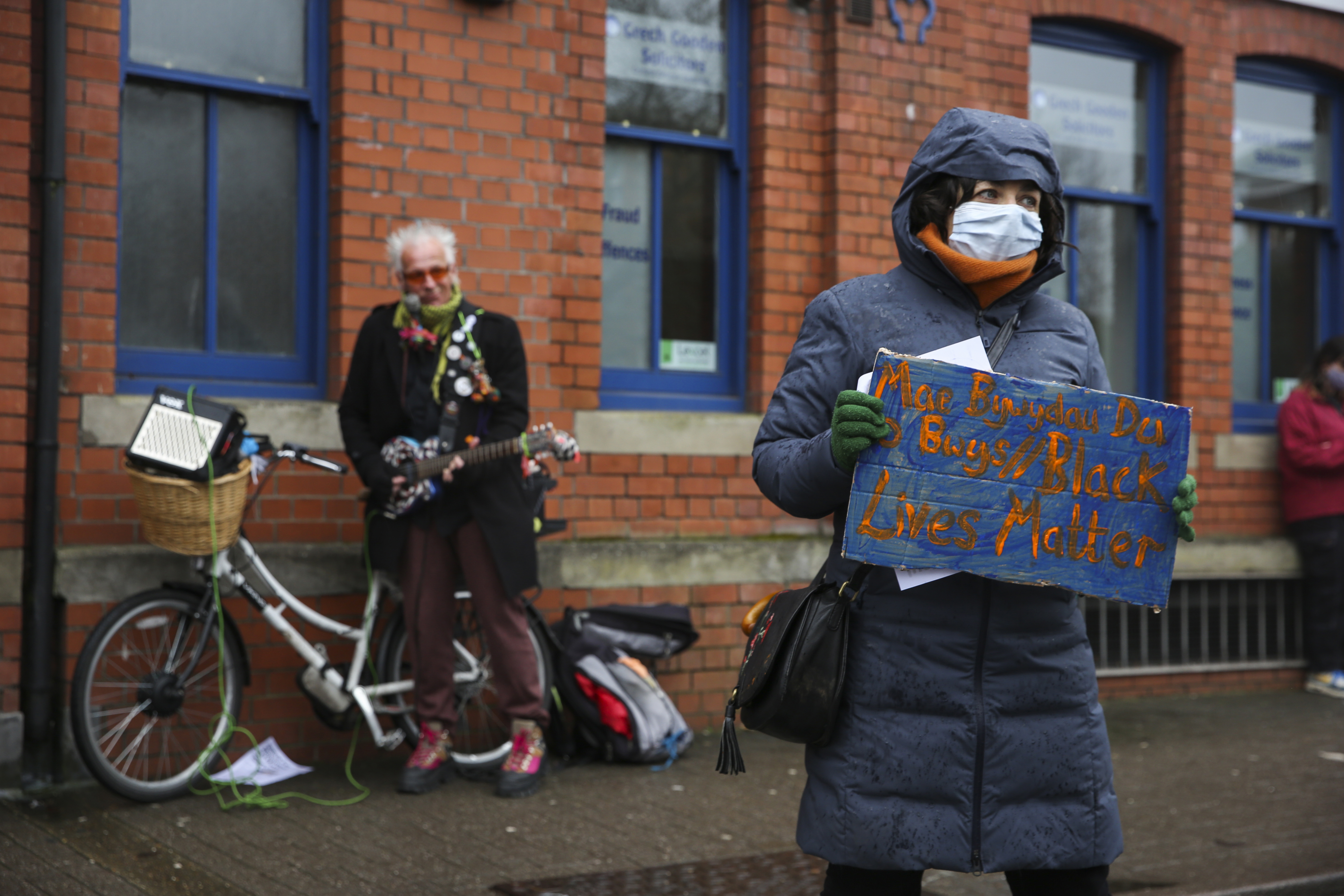
Police “Beyond Redemption” Says Activist Kate Wilson, After Spy Cops Victory & Brutal Murder of Sarah Everard
• In a landmark victory in the decade-long spy cops case, judges ruled in favour of Kate Wilson, who was deceived into a sexual relationship with undercover cop Mark Kennedy
• Judges also heavily criticised senior officers who turned a blind eye to the relationship’s existence, and suggested that there was “a lack of interest” in protecting women’s human rights.
• Following the court victory, Kate Wilson made a link between her case and the murder of Sarah Everard by PC Wayne Couzens, saying he was not a ‘rogue officer’ and that the police fostered “a culture of toxic misogyny.”
Image: Campaigners outside court, via Police Spies Out Of Lives
Political activists who were spied on for years by police hailed a major victory this week against the undercover infiltration of protest groups and the practices of the officers involved.
Kate Wilson was deceived into a long term sexual relationship with undercover cop Mark Kennedy, who infiltrated leftwing groups for seven years whilst working for the Metropolitan police.
Kennedy entered into a sexual relationship with Wilson that lasted over a year whilst he pretended to be a fellow activist and lied about his true identity as a police officer sent to infiltrate the groups she associated with.
During the course of their relationship, which lasted from November 2003 to February 2005, judges ruled that Kennedy “insinuated himself into every aspect of her [Wilson’s] private and family life.”
Kennedy, who was married with children, also entered into sexual relationships with other women while carrying out surveillance, as did a number of other undercover police officers who were engaged in similar work. Wilson discovered Kennedy’s true identity in 2010 after he was unmasked by activists.
He was one of 139 undercover cops deployed to spy on more than 1,000 political groups since 1968.
After a laborious 10-year legal battle fought primarily by Wilson herself and her supporters, who could not afford lawyers, three judges in the Investigatory Powers Tribunal (IPT) delivered a damning verdict on Thursday against the undercover policing operations and the acts undertaken by its officers. The supervision of the covert operation was “fatally flawed” they said, and could not be justified as necessary in a democratic society. They cited “disturbing and lamentable failings at the most fundamental levels”.
Judges in the tribunal ruled that Wilson’s human rights were violated in five ways, including inhuman and degrading treatment, sexist discrimination, and interference with the right to hold political opinions and to freedom of expression and association.
The judges also criticised senior officers in charge of Kennedy, ruling that they “either knew of the relationship, chose not to know of its existence, or were incompetent and negligent in not following up” the obvious signs of the relationship’s existence.
The 158-page ruling declared that senior officers in the operation appeared to have a policy of “don’t ask, don’t tell” towards their spies who were deceiving women into sexual relationships. Judges also said that such managers probably had “a lack of interest” in protecting women’s human rights, which were clearly abused by those in a position of power.
The ruling is a major victory for all those currently campaigning over police infiltration into left wing political groups which spanned several decades. Mark Kennedy’s actions were not unique: his fellow cops used exactly the same method of deceiving women into long term relationships, with some even having children with them before disappearing and leaving a trail of trauma and abuse.
The landmark Spy Cops verdict was delivered at a time when widespread anger and rage has been directed towards the police, after the brutal murder of Sarah Everard earlier this year by a Met police officer. Wayne Couzens raped and murdered Sarah Everard after kidnapping her during a fake arrest, where he showed a warrant card and used handcuffs to detain her.
Couzens – who was nicknamed “the rapist” by colleagues – is also linked to two previous allegations of indecent exposure, and a Whatsapp group with five other police officers who are being investigated for gross misconduct. In the Whatsapp group the officers allegedly shared “discriminatory” messages and misogynistic content.
On Twitter, Kate Wilson drew links between Sarah Everard’s murder and a wider culture of misogyny and abuse of power in the police: “Sarah Everard’s killer WAS police. While @metpoliceuk hide behind these claims that it is only “rogue officers” and “bad apples” they will always be guilty of fostering a culture of toxic misogyny. We need accountability not damage limitation and cover ups.”
The Met has been rocked by the level of popular anger which has erupted against it in the past week.
Their response to Sarah Everard’s brutal murder by a serving cop whose background was known – and to the wider feelings of distrust amongst women – has been to increase the presence of police. This is to be done via “reassurance patrols” and “treat indecent exposure allegations more seriously”, with an extra 650 new officers to patrol busy public areas in London.
The Met have also released advice stating that women should “wave a bus down” or “call 999” if they have concerns when stopped by an officer, and to question any plain-clothes officer acting alone in an arrest.
This advice has faced a fierce backlash by women and activists alike, who have pointed to the fact that Couzens was a serving officer at the time of the murder and that he was already nicknamed “the rapist” by colleagues.
The suggestion that checking an officer’s identity or legitimacy, or resisting arrest, is a course of action open to women given the enormous power held by the police has also been attacked.
But it is also a sign of how worried the police are about the fact that their legitimacy and moral authority is being questioned in a way rarely, if ever, seen.
Met Police Commissioner Cressida Dick has faced widespread calls to resign, something that would heighten the crisis within the Met. But there are many who believe surface-level changes simply do not go far enough, as the issue of misogyny runs too deep. Speaking to Sky News, Wilson dismisses the narrative pushed by the police that Sarah Everard’s killer was a “rogue officer” or “bad apple.”
“Resignations wont fix it. Nothing @metpoliceuk do is about accountability. We need real change” she tweeted.
In an article for the Guardian, Wilson criticised the idea that resignations would be enough. “Cressida Dick’s resignation will not address these systemic problems that go back decades. What is required is a serious rethink and root-and-branch changes to the Metropolitan police service, an institution that is, in my opinion, beyond redemption.”
Since the Black Lives Matter (BLM) movement swept the UK last year after Black man George Floyd was killed by Minneapolis cops in the U.S., discussions over the function of the police, and the future of policing in the UK have moved from academic circles into the public sphere.
The huge Kill the Bill movement earlier this year, which erupted following Everard’s murder and was against increasing police powers, has seen its core arguments vindicated and now the idea of police abolitions itself is finding new resonance.
“At the moment at least it feels like there is a shift in the public’s perception of the police,” writes socialist activist and researcher in psychoanalysis, J.S. Titus. “The Met are sending out bizarre advice, effectively telling people to resist arrest if they don’t trust the police! This reflects a massive crisis of confidence and legitimacy for the cops and presents an opportunity for abolitionists and anti-capitalists.”
Police Spies Out Of Lives: https://t.co/7sustHkVdO?amPolp=1



1 Comment
Comments are closed.